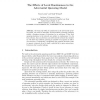Free Online Productivity Tools
i2Speak
i2Symbol
i2OCR
iTex2Img
iWeb2Print
iWeb2Shot
i2Type
iPdf2Split
iPdf2Merge
i2Bopomofo
i2Arabic
i2Style
i2Image
i2PDF
iLatex2Rtf
Sci2ools
120
Voted
ESA
2008
Springer
2008
Springer
The Effects of Local Randomness in the Adversarial Queueing Model
Abstract. We study the effect of randomness in the adversarial queueing model. All proofs of instability for deterministic queueing strategies exploit a finespun strategy of insertions by an adversary. If the local queueing decisions in the network are subject to randomness, it is far from obvious, that an adversary can still trick the network into instability. We show that uniform queueing is unstable even against an oblivious adversary. Consequently, randomizing the queueing decisions made to operate a network is not in itself a suitable fix for poor network performances due to packet pileups.
Related Content
| Added | 19 Oct 2010 |
| Updated | 19 Oct 2010 |
| Type | Conference |
| Year | 2008 |
| Where | ESA |
| Authors | Yann Lorion, Maik Weinard |
Comments (0)

